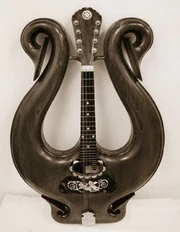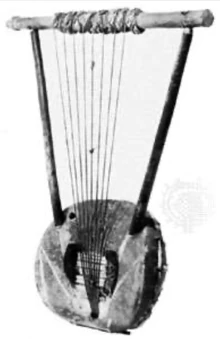
Lyre

One of the first versions of a lyre.
The Lyre is a stringed musical instrument well known for its use in classical antiquity and later. The word comes from the Greek "λύρα" (lyra)[1] and the earliest reference to the word is the Mycenaean Greek ru-ra-ta-e, meaning "lyrists", written in Linear B syllabic script.[2] The earliest picture of a lyre with seven strings appears in the famous sarcophagus of Hagia Triada (a Minoan settlement in Crete). The sarcophagus was used during the Mycenaean occupation of Crete (1400 BC).[3][4] The recitations of the Ancient Greeks were accompanied by lyre playing. The lyre of Classical Antiquity was ordinarily played by being strummed with a plectrum, like a guitar or a zither, rather than being plucked, like a harp. The fingers of the free hand silenced the unwanted strings in the chord. The lyre is similar in appearance to a small harp, but with certain distinct differences.
The word Lyre can either refer specifically to a common folk-instrument, which is a smaller version of the professional kithara and eastern-Aegean barbiton, or lyre can refer generally to all three instruments as a family.
The term is also used metaphorically to refer to the work or skill of a poet, as in Shelley's "Make me thy lyre, even as the forest is"[5] or Byron's "I wish to tune my quivering lyre,/To deeds of fame, and notes of fire"[6]
Contents[][hide] |
